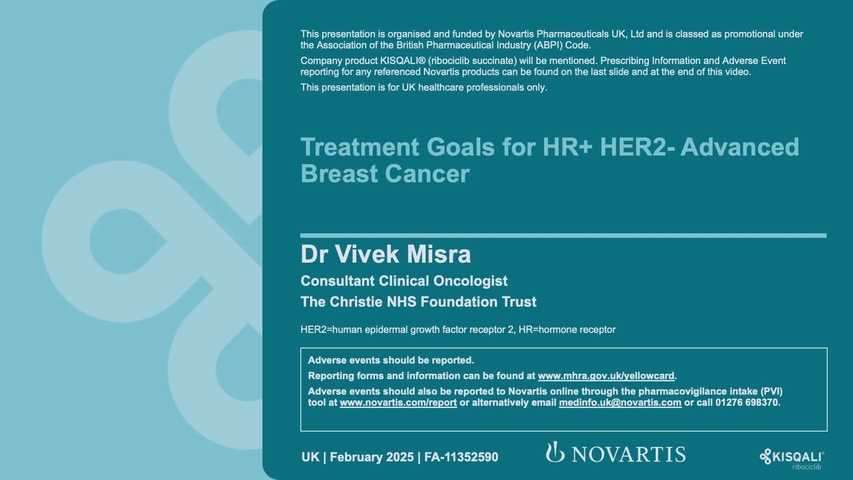

Indications:1
KISQALI® (ribociclib) is indicated for the treatment of women with hormone receptor (HR)-positive, human epidermal growth factor receptor 2 (HER2)-negative locally advanced or metastatic breast cancer in combination with an aromatase inhibitor or fulvestrant as initial endocrine-based therapy, or in women who have received prior endocrine therapy.
In pre- or perimenopausal women, the endocrine therapy should be combined with a luteinising hormone-releasing hormone (LHRH) agonist.
KISQALI is not recommended to be used in combination with tamoxifen.
Please refer to the Summary of Product Characteristics for the full safety profile and guidance regarding managing adverse events.
Click the play button below to watch a video from Dr Vivek Misra
Watch this video to understand more about the treatment goals for patients with HR+/HER2– aBC and how to involve your patients in shared decision making.
The most common adverse reactions (reported at a frequency ≥20%) in the pooled dataset for which the frequency for Kisqali plus any combination exceeds the frequency for placebo plus any combination were neutropenia, infections, nausea, fatigue, diarrhoea, leukopenia, vomiting, headache, constipation, alopecia, cough, rash, back pain, anaemia and abnormal liver function tests.1
aBC, advanced breast cancer; HER2–, human epidermal growth factor receptor 2-negative; HR+, hormone receptor-positive; LHRH, luteinising hormone-releasing hormone.
Reference
KISQALI® (ribociclib) Summary of Product Characteristics.
UK | March 2025 | FA-11374319
Adverse events should be reported. Reporting forms and information can be found at www.mhra.gov.uk/yellowcard. Adverse events should also be reported to Novartis online through the pharmacovigilance intake (PVI) tool at www.novartis.com/report, or alternatively email [email protected] or call 01276 698370.


